Lawmaker Says Iran-China Deal Can Prompt US Return To JCPOA

A senior Iranian lawmaker says the 25-year strategic agreement with China will worry the United States and may push Washington to compromise in the ongoing nuclear talks.

A senior Iranian lawmaker says the 25-year strategic agreement with China will worry the United States and may push Washington to compromise in the ongoing nuclear talks.
Ahmad Amirabadi Farahani, who is the chairman of Iran-China parliamentary friendship group, said on Sunday that the deal can convince the US to expedite efforts to return to the 2015 nuclear deal and lift Iran sanctions.
On Saturday, Iranian Foreign Minister Hossein Amir-Abdollahian and Chinese Foreign Minister Wang Yi announced the official commencement of the agreement's implementation.
Farahani described the agreement as an important step to increase Chinese investments in Iranthat will expand Tehran’s ties with the entire region.
He criticized the former president Hassan Rouhani’s administration for trying to mend ties with the Western countries, saying that the strategy of the incumbent government is focusing on relations with regional states.
Farahani said negotiations are underway now so that Tehran can increase collaboration with Saudi Arabia, Qatar, and Oman, while the country’s membership in the Shanghai Cooperation Organization can further boost relations with Turkmenistan and Pakistan.
He noted that Washington seeks to weaken the economies of Iran and China, therefore this common enemy can help strengthen relations between Tehran and Beijing, and the 25-year deal is a good step in this direction.
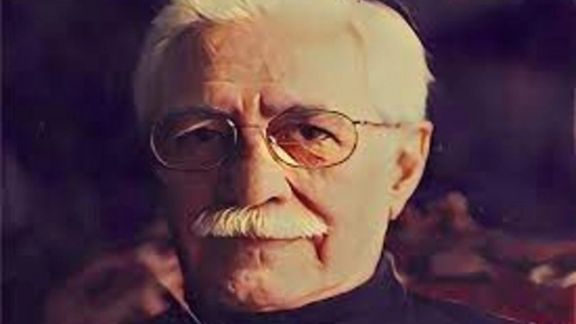
Iraj Pezeshkzad who immortalized the phrase, "It's the work of the British" in the most popular satirical Persian novel of the 20th century, passed away this week in California at the age of 94.
The highly acclaimed work, My Uncle Napoleon, was published in the early 1970s and was made into an extremely successful TV series. It was banned after the Islamic Revolution of 1979 but is still among the most sought after underground works of literature and film in Iran.
In Pezeshkad's novel set at the onset of the Second World War in Tehran, the small local wars that the main character of the book, a low-ranking officer once fought, gradually evolve into great wars against the British on par with the Napoleonic Wars. Uncle Napoleon's orderly, the simple and uneducated Mash Ghasem, not only begins to believe, or pretend to believe in the stories of Uncle Napoleon's heroic wars against the British, but also increasingly attempts to weave stories of his own heroism into it but the imaginary adventures only make the delusional patriarch the laughingstock of the family.
Pezeshkzad, a former French-educated judge and diplomat, captured the imagination of Iranian readers with his most vivid characters in a manner that no other contemporary author has. There is almost no one in Iran who is not familiar with his characters and its many famous catchphrases including, "It's the work of the British."
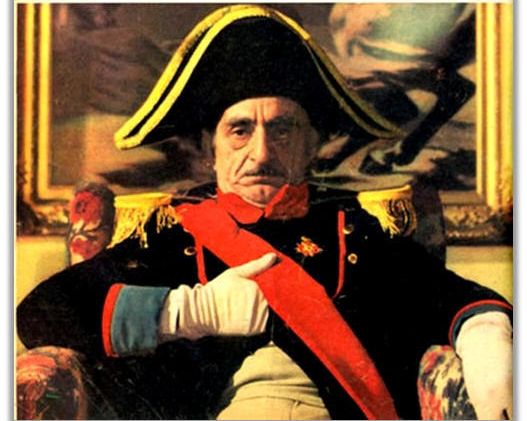
The main character of My Uncle Napoleon has gradually come into believing his own stories, identifying himself with Napoleon, and living in constant fear of British plots to kill, or failing that, to dishonor and discredit him. "It's the work of the British", the old man will say in the face of any mishap that befalls him or his family. Even a sex scandal involving a niece of the family in Uncle Napoleon's delusional mind, is cited as proof that there is a British conspiracy against him.
The fame of the book and its catchphrase is such that British diplomats in Iran in the years following the publication of the book came to know about it probably within the first few days from their arrival. Former British Foreign Secretary Jack Straw even took inspiration from it to write a book entitled "The English Job: Understanding Iran and Why It Distrusts Britain".
Amongst British diplomats, there’s a poignant joke that ‘Iran is the only country in the world which still regards the United Kingdom as a superpower’. For many Iranians, it’s not a joke at all," an introduction to Straw's book said.
Nearly two centuries of Iranian politics, particularly the 19th century, was deeply influenced by the British-Russian embassies and their rivalries. Many Iranians still see the hand of the British in everything. Probably with the historical fear of the Iranians toward the British in mind, Iran's Supreme Leader Ali Khamenei in 2009 cast the blame for nationwide unrest following a disputed election on the British government. Hardliners claimed the British were behind the "sedition" against the Islamic
Pezeshkzad never singled out a real-life inspiration for the pathetic, delusional and bullying character who the children of the family including the narrator always called Uncle Napoleon amongst themselves. In a speech at the University of California, Los Angeles, Pezeshkad said the character originated in his memories of his childhood when grownups would indiscriminately label most politicians as "British lackeys".
Pezeshkzad made every episode of love or feud in Uncle Napoleon's family into funny, yet often very tender, narratives. His book, he told BBC Persian years ago, was inspired by the story of his own naive teenage love and memories from his own extended family. Pezeshkzad's book has been translated into several European languages including English.
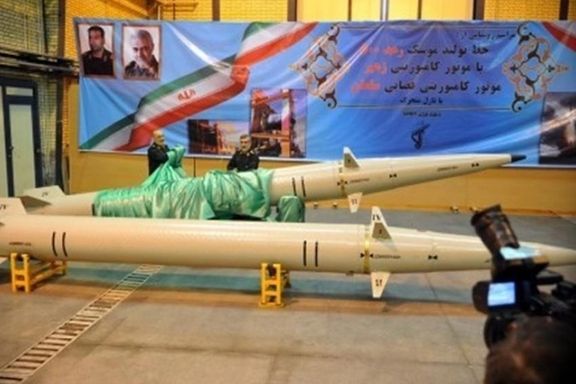
Social media reports by journalists and citizens in Iran say a series of loud explosions were heard tonight in Western Iran, around the cities of Hamedan and Kermanshah.
Some reports quote Iran's Revolutionary Guard as saying that they launched air defense drills in the region, but it cannot be independently verified.
Social media reports said that there was anti-aircraft activity, but it is not clear if it was part of drills or not.
One video, that Iran International cannot verify its authenticity, includes sounds that resemble anti-aircraft gun fire, and a voice in the video says explosions were heard. The images are from a city, but no location is mentioned.
There are no reports of aircraft activity in the region, but one tweet said an anti-aircraft missile was fired and there was one explosion near or at a military base.
The weather in western Iran on Saturday was overcast with rain and snow, which reduces the likelihood of military drills.
Tensions are high in the region amid Iran’s nuclear talks with world powers. Israel has repeatedly said it will not tolerate Iran reaching a nuclear breakout point, while Tehran has threatened severe retaliation in case of any attack.
Iran has held several military exercises in recent months.

The health ministry reported Iran's first three deaths from the highly contagious Omicron coronavirus variant on Saturday as the number of infections increased.
"The number of patients with Omicron in the country has reached 1,162 and ... one death has been reported due to Omicron in each of the cities of Tabriz, Yazd and Shahrekord, and one critically ill patient is hospitalized in Ahvaz," ministry spokesman Mohammad Hashemi told state broadcaster IRIB.
Iran this week lifted restrictions on land travel to and from neighboring countries and some European states while the impact of the new variant remained unclear. Tehran maintained a ban on arrivals from Britain, France and eight countries in Southern Africa over Omicron fears, local media reported.
Iran, the second country in the world after China that experienced the pandemic and its epicenter in the Middle East, has suffered 132,044 deaths in five waves of COVID-19 infections since February 2020. Health experts and some politicians believe that the official numbers are too low and some allege a cover-up.
Deaths have fallen in recent months and stood at 18 on Saturday, a 22-month low, after Iran expanded vaccination in August following a slow start.
More than 53 million of Iran's population of about 85 million have received two doses of coronavirus vaccine, and 12.2 million have received three doses.
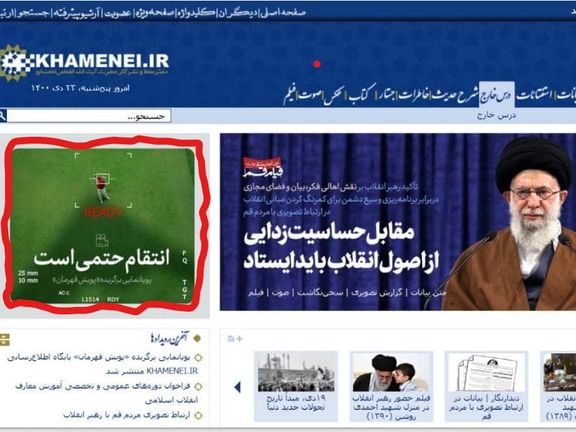
Twitter has permanently suspended one of Iranian leader Ali Khamenei’s accounts apparently for sharing an animation video depicting the killing of Donald Trump.
KhameneiSite, which was suspended is just one of the accounts controlled by Khamenei’s office. Iranian Twitter users have been urging the social media giant to suspend all his accounts for its violent and vitriolic content. Many say that if Donald Trump’s account can be suspended, Khamenei’s accounts should also be closed.
On January 13, Khamenei’s official website posted an animation video showing an all-terrain vehicle with an operator on board driving through a golf course and approaching a point from where its camera shows a man who looks like Trump playing golf. The operator targets the figure and a large gun on top of the vehicle aims at the target and the video ends.
The same video was reportedly shared on Twitter, with threats to avenge the killing of Qasem Soleimani, and then deleted, which could be the reason why @KhameneiSite was suspended.
Khamenei and other top Iranian officials have been threatening revenge against former US officials whom they blame for killing its chief military and intelligence operator in the Middle East in January 2020.
Last January, Twitter suspended another one of Khamenei’s accounts after it also published a threat against Trump.
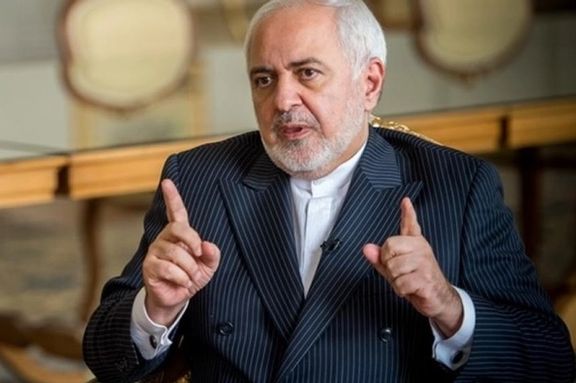
Mohammad Javad Zarif was not invited to a policy meeting with President Ebrahim Raisi because he criticized Russia last year, a Tehran newspaper said Saturday.
Sharq daily said that Riaisi invited a meeting of former foreign ministers and top officials this week to discuss his upcoming trip to Moscow, but Zarif was not invited. The newspaper added that not inviting him could be related to his criticism of Russia in an audio file released by Iran International last April.
In the confidential recording, Zarif had criticized both former Qods Force commander Qasem Soleimani and Russia for harming the prospects of JCPOA, Iran’s 2015 nuclear agreement with world powers. Zarif argued that Russia tried to harm the JCPOA, and at one point he to use “rude and non-diplomatic language” with Russian foreign minister Sergei Lavrov.
Iran’s hardliners always attacked Zarif accusing him of being more concerned with having good relations with the West and engineering the nuclear agreement, which former US president Donald Trump abandoned in 2018.
Raisi is scheduled to visit Moscow on January 19 and reports speak of his plans to purchase Russian arms and sign a 20-year cooperation agreement.
Pundits and citizens in Iran have been increasingly criticizing Russia recently, accusing it of trying to use Iran and its nuclear dispute for its own interests.